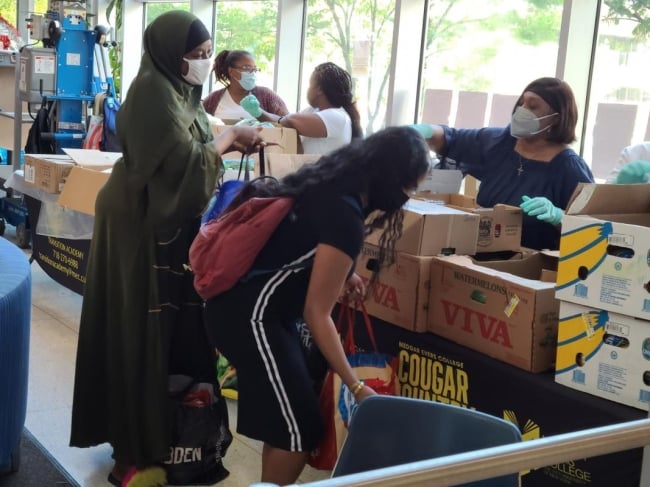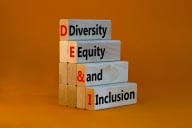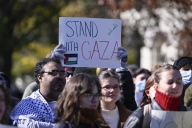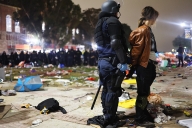You have /5 articles left.
Sign up for a free account or log in.

People gather at the campus food pantry at Medgar Evers College.
Medgar Evers College
Medgar Evers College, the City University of New York system’s only predominantly Black institution, received the largest grant in its history this summer as the college and its surrounding community in central Brooklyn struggle to recover from the pandemic.
The $20 million grant was provided by the office of New York City mayor Bill DeBlasio as a part of his Juneteenth Economic Justice Plan, a new initiative created after June 19 was made a federal holiday last month. Juneteenth commemorates the day in 1865 when Black people in Texas learned that slavery had been abolished and they were free citizens.
The plan includes a smorgasbord of initiatives tied to education, including $45 million in scholarships for 2,800 low-income students in the CUNY system; more than 1,000 of the scholarships will go to Medgar Evers students.
“Juneteenth marked the end of slavery, but not the end of systemic, structural racism in America,” de Blasio said in a press release. “To begin to repair harms of the past, New York City is investing in the future and building generational wealth.”
Under the plan, Medgar Evers will receive $4.5 million over five years to establish the Brooklyn Recovery Corps -- modeled on the Bronx Recovery Corps at Lehman College -- which will pay and give academic credit to 200 students annually to work in local small businesses and nonprofits affected by the pandemic. The program is intended to help with the borough’s economic recovery efforts and give students an opportunity to get work experience related to their majors.
CUNY chancellor Félix V. Matos Rodríguez praised de Blasio for implementing a plan that extends “access to top-quality postsecondary education to African American and other New Yorkers most disproportionately impacted by COVID-19.”
“We are grateful for this affirmation of CUNY as an engine for social mobility, academic excellence, affordability and social justice, as well as a vital and catalyzing partner in the recovery of our city and state,” he said in a press release.
Some Black scholars and students have voiced skepticism about Juneteenth-related initiatives in higher education and are concerned about one-off efforts that are largely symbolic and may have limited results rather than addressing systemic inequities over the long term.
Patricia Ramsey, president of Medgar Evers, believes the new grant will have a “great impact,” not just on students but also on communities surrounding the college.
The campus in the Bedford-Stuyvesant neighborhood has been “inextricably linked” to the wider central Brooklyn community since its founding 50 years ago. Community organizers from groups such as the local NAACP chapter called for a four-year public institution in the area for years before the college was established in 1970.
Brian Purnell, associate professor of Africana studies and history at Bowdoin College in Maine, who has researched the history of central Brooklyn, noted that the term “central Brooklyn” was coined by Black activists and resulted from the same activism in Brooklyn that led to the formation of Medgar Evers College. He said community organizers used "central Brooklyn" to refer to a group of neighborhoods with sizable Black communities and to push back on New Yorkers who colloquially used Bedford-Stuyvesant as a “catch-all phrase for Black people in Brooklyn and particularly poor Black people in Brooklyn, crime areas where Black people lived in Brooklyn.”
“Medgar Evers was a part of larger trends, larger protest movements that extended back to the mid-1950s at least -- protest movements against racial segregation and racial inequities in public schools.”
Ramsey said the Brooklyn Recovery Corps was a critical component she pressed for in conversations with the mayor’s office about allocating the Juneteenth funding.
“Whenever someone presents something to me, I think not only about what it can do for the students on our campus but for the community as a whole, because it was the community that is responsible for the institution even existing,” she said.
Ramsey also sees the scholarships that will be provided as a way to “uplift the community” by helping students from the area graduate and improve their earning potential and possibly increase the income base of the area.
The Juneteenth Economic Justice Plan also establishes a scholarship program at Medgar Evers that is currently available at CUNY's Lehman College and John Jay College, which provides students tuition waivers, free MetroCards, money for textbooks and extensive wraparound supports to help them graduate within four years. The Accelerate, Complete and Engage (ACE) program is open to new full-time, first-year students or transfer students with a CUNY associate degree who are New York State residents and applied for federal financial aid and the state Tuition Assistance Program.
Medgar Evers students and central Brooklyn residents have disproportionately suffered from the fallout of the pandemic and economic downturn.
The college serves high numbers of low-income students. About 64 percent of students meet the eligibility requirements for the federal Pell Grant, and the median family income is below $35,000 a year, Ramsey said. The median household income for Brooklyn is $60,231 per year, according to 2019 U.S. Census Bureau data. Most students come from minority communities that suffered high rates of infections, deaths and job loss during the pandemic. The student population is 82 percent Black and 14 percent Latinx.
Enrollment at the college fell from 5,798 students in fall 2019 to 5,237 students in fall 2020, almost a 10 percent drop, more than double the average for public four-year universities nationwide during that time. Some have attributed enrollment declines across the CUNY system to the fact that New York City was the epicenter of the pandemic for a good part of last year.
Waleek Boone, a student life specialist at Medgar Evers, said he saw high levels of food and housing insecurity among students and local residents during the public health crisis. He works in the college's Transition Academy, which provides food and housing assistance to students, and has helped about 50 students avoid eviction, secure housing or navigate the city's homeless shelter system since the pandemic was declared in March 2020. The center's food pantry gave out 4,000 bags of groceries and expanded its hours to meet increased student demand.
Brittany Beckford, a 24-year-old psychology major, was one of the students who turned to the college for help. She said she was forced out of where she was living in June of last year and hopped from one friend’s couch to another for a month and a half before moving into a homeless shelter.
“It was a scary experience for me, because it wasn’t something I expected to go through, especially at my age and this stage of my life,” she said. “It’s not where I saw myself at all.”
Beckford, who now has permanent housing, said the infusion of cash to Medgar Evers could help students like her.
Boone agrees.
“The funds are so much needed,” he said. “For so much of our students, they view a higher education degree as a step to better their living conditions. With this grant, they will have an opportunity to fulfill that dream.”
Boone said residents of neighborhoods near the college would also benefit from the city grant. After the pandemic shuttered business, cost people their jobs and led to temporary shortages of meat and other basic staples at local grocery stores, the food pantry started serving central Brooklyn residents in December 2020. Up to 200 people have since been showing up for Community Pantry Tuesdays.
Multiple central Brooklyn neighborhoods, such as Bedford-Stuyvesant, Brownsville and East Flatbush, were on the mayor’s list of 33 hardest-hit neighborhoods in the city in January 2021. The ZIP codes that include parts of Bedford-Stuyvesant collectively had more than 28,000 cases of COVID-19 and more than 1,000 deaths since February 2020, according to data from the New York City Department of Health and Mental Hygiene.
Purnell pointed out that the low- and middle-income area is home to many African American senior citizens and people who likely served as essential workers.
“COVID-19 is no respecter of persons -- it’ll kill you if you’re rich, it’ll kill you if you’re poor, it’ll kill you if you’re Black, it’ll kill you if you’re white,” Purnell said. “However, we also know that it’s a social pandemic … Not all members of the public are affected equally.”
Because of the historic ties between Medgar Evers and central Brooklyn at large, Purnell believes the “much-needed financial injection” may prove a smart strategy for helping the area recover.
Medgar Evers is “specifically targeting African American working-class and working poor students in central Brooklyn,” he said. “This is a good start. Hopefully it will be able to stem the tide that COVID has caused these people and these communities.”









